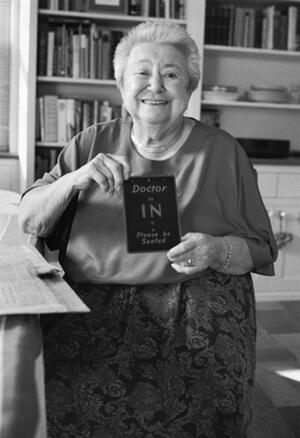Ruth Finkelstein
Born in 1909, Dr. Ruth Finkelstein was raised in the Bronx and attended the Jacobi School, a private academy for Jewish girls. With her father's strong support, Ruth came to Baltimore to study at Johns Hopkins University despite limited financial means. She went on to become the first female student accepted from the undergraduate program into their medical school. After graduating in 1935, she was denied entry into surgery as a specialty because of her gender. Ruth decided to focus on obstetrics and remained in the field for over fifty years. Early in her career, Ruth worked as an assistant in Dr. Bessie Moses's Bureau for Contraceptive Advice (a forerunner of Planned Parenthood), which led to her active involvement in family planning issues. She married Harry Greenberg in 1942 and, with his encouragement, established a private practice in the early 1940s. After the birth of their two children, Emily and David, she juggled motherhood and career, creating clinics and programs focused on reproductive health for women and serving on the board of Planned Parenthood Federation of America. Ruth assisted and counseled numerous women who were unable to obtain legal abortions prior to the Supreme Court's landmark decision in Roe v. Wade. Ruth Finkelstein died on April 7, 2002.
Ruth discusses her Polish background, her parent's lives, and growing up in New York City, the eldest of five children. Her father encouraged Ruth and her siblings in their education. He worked as a customs officer while Ruth's mother stayed home to take care of the family. Ruth describes the apartment where she grew up, memories of her mother cooking in the kitchen, and celebrating the High Holidays with her grandparents. Ruth talks about her experiences at the Jacobi School, a private girls' school, comparing herself to the wealthier students. After high school, Ruth moved to Baltimore to study pre-med at John Hopkins University and boarded with a local family. She was the first woman admitted from undergraduate school to medical school in 1926. Ruth was often the only woman in her classes and felt pressure to excel as a female medical student. As a medical student, Ruth worked in the Post-Partum Clinic under Bessie Moses, a pioneering obstetrician and gynecologist, who played a major role in the birth control movement. Ruth encountered barriers and sexism for the first time when she was not allowed to train as an OB/GYN surgeon. She went on to teach sex education in schools, promoting the use of contraceptives and providing referrals and support for abortions. Ruth recalls her experience apprenticing as an obstetrician at Sinai Hospital, with the chief of obstetrics, her memory of the first delivery of a baby as a medical student, and complicated home deliveries. She remembers meeting her husband, Harry Greenberg, through friends and how he supported Ruth's career and encouraged her to open her own practice, which she did in the 1940s. When Ruth's children were born, he stopped practicing obstetrics for a while. When she returned to work, balancing career and home life was a challenge. Ruth reflects on family life, the death of her husband to cancer, motherhood, and the lives of her children and grandchildren. She reflects on life after the death of her husband, her leisure activities, involvement with Planned Parenthood, and engagement in the Jewish community.



